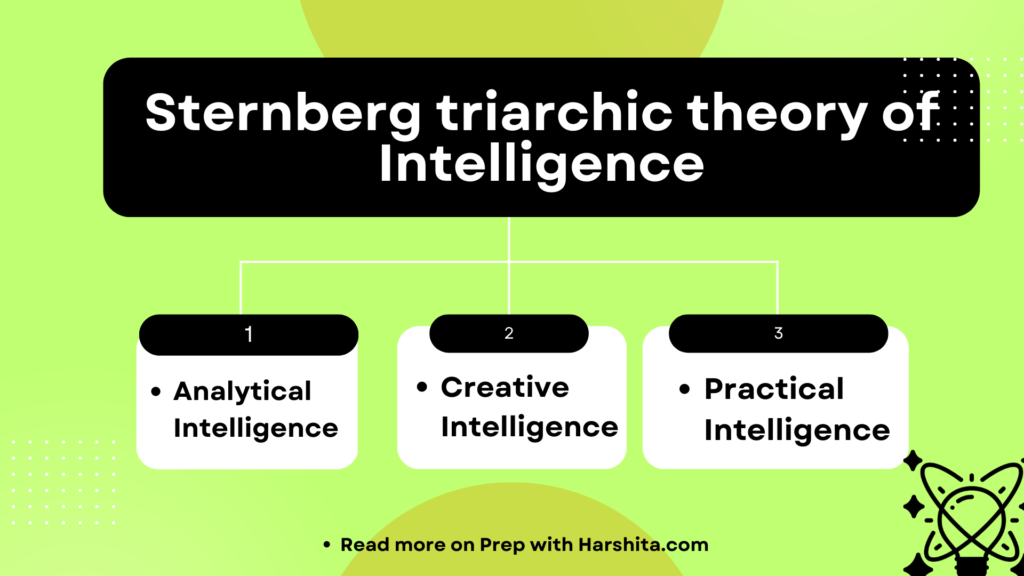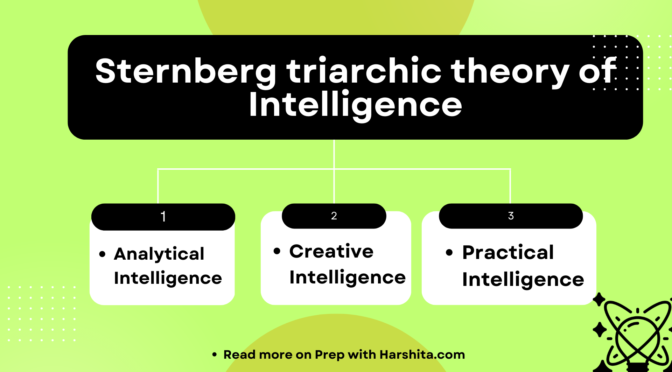The Sternberg Triarchic Theory of Intelligence is a theory proposed by psychologist Robert J. Sternberg in the 1980s that identifies three distinct aspects of intelligence: analytical, creative, and practical. Sternberg’s theory suggests that intelligence is a multifaceted construct that cannot be adequately captured by a single measure or definition.
Different type of Intelligence according to him:
- Analytical intelligence: This aspect of intelligence involves the ability to analyze, evaluate, and solve problems using logical reasoning and critical thinking. It includes the ability to analyze information, break down complex problems into their component parts, and evaluate the pros and cons of different solutions. Analytical intelligence is typically measured by standardized tests that assess skills such as verbal and mathematical reasoning.
- Creative intelligence: This aspect of intelligence involves the ability to generate novel ideas, think outside the box, and solve problems in new and innovative ways. It includes the ability to approach problems from different angles, make connections between seemingly unrelated concepts, and generate new and original solutions. Creative intelligence is often associated with artistic and scientific creativity and is not typically measured by standardized tests.
- Practical intelligence: This aspect of intelligence involves the ability to adapt to and navigate real-world situations, including social situations. It includes the ability to use common sense, practical knowledge, and interpersonal skills to solve problems and achieve goals. Practical intelligence is often referred to as “street smarts” and is important for success in everyday life, such as in the workplace or in social situations.
Sternberg’s theory emphasizes the importance of contextual factors in determining intelligence. He argues that intelligence is not simply a fixed trait, but rather a dynamic and malleable set of abilities that can be improved over time through experience and practice. Sternberg also suggests that intelligence is not domain-specific, meaning that individuals can possess high levels of intelligence in one aspect (e.g., creative intelligence) but not in another (e.g., analytical intelligence).
One of the strengths of Sternberg’s Triarchic Theory of Intelligence is its focus on practical intelligence, which has traditionally been overlooked in other theories of intelligence. However, the theory has also been criticized for its lack of empirical support and for the difficulty in measuring and assessing the different aspects of intelligence proposed by the theory. Nonetheless, Sternberg’s Triarchic Theory of Intelligence has been influential in the field of psychology and has influenced the development of more recent theories of intelligence, such as the theory of emotional intelligence.
Also Read : Gardner Theory of Multiple Intelligence

Also Visit : Prep with Harshita


Hello there, just became aware of your blog through Google, and found that it is really informative. I am gonna watch out for brussels. I’ll appreciate if you continue this in future. A lot of people will be benefited from your writing. Cheers!